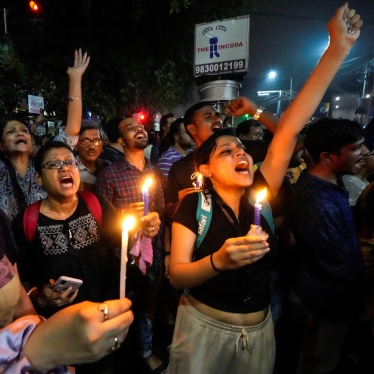An Egyptian military court’s conviction of an opposition parliamentarian for criticizing the armed forces is the latest attack in the government’s crackdown on free expression, Human Rights Watch said today.
On October 31, a military court in Cairo sentenced Talaat al-Sadat, a member of parliament for the opposition al-Ahrar party and nephew of late President Anwar al-Sadat, to one year in prison for “insulting the military and the republican guard.”
In the days before the 25th anniversary of his uncle’s October 6, 1981 assassination, al-Sadat gave a series of press interviews in which he called for an investigation into the late president’s death and accused senior government officials of participating in an international conspiracy that led to the assassination of President Sadat. On October 5, Speaker of the People’s Assembly Fathi Surur, acting at the request of Egypt’s military prosecutor general, stripped Talaat al-Sadat of his parliamentary immunity to face charges of “spreading false rumors” and “insulting the armed forces and the republican guard” before a military court. Al-Sadat’s trial opened on October 11. Throughout his trial, al-Sadat maintained that he was being prosecuted for his opposition to the government.
“Al-Sadat’s prosecution and sentence send a chilling message to anyone who dares to raise sensitive issues in Egypt,” said Sarah Leah Whitson, Middle East director at Human Rights Watch. “No one should be tried in a military court or any other court for criticizing a public institution or a public official.”
Egypt’s criminal code contains several laws that allow the government to silence critics. Article 184 of the Penal Code states that “whoever affronts or insults ... the army ... shall be penalized by detention.” Article 102(bis) criminalizes “spreading false rumors.” Law 97 of 1992 criminalizes a range of nonviolent political activity and allows the president to refer civilians to military courts whose verdicts may not be appealed.
Such laws contravene Egypt’s obligations under international law to respect the rights to free expression and to a fair trial. The International Covenant on Civil and Political Rights, which Egypt ratified in 1982, states that everyone has the right to free expression (article 19). The covenant also affirms that, “Everyone convicted of a crime shall have the right to his conviction and sentence being reviewed by a higher tribunal according to law” (article 14).
The practice of trying civilians before military courts raises numerous fair-trial issues under international law. The UN Human Rights Committee – the body of experts authorized to interpret and monitor compliance with the covenant – has stated that the trial of civilians by military courts should be very exceptional and occur only under conditions that genuinely afford full due process.
“Al-Sadat should be released immediately,” Whitson said. “Once again, the Egyptian government is violating fundamental rights and creating political dissidents instead of openly engaging its critics.”
This is the second time in recent months that a military prosecutor has brought charges against someone for insulting the armed forces. On September 11, a military prosecutor summoned Ayhab al-Zalaqi, a journalist for the independent weekly al-Dustur, for “insulting the armed forces” in an August article where he cited works published outside Egypt questioning whether Egypt had won the 1973 war with Israel. Al-Zalaqi told the prosecutor he had expressly distanced himself from these opinions in his article, and the prosecutor did not refer the case to trial.








